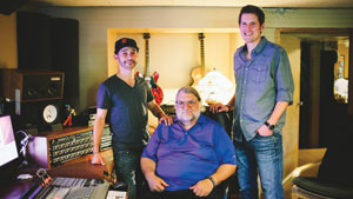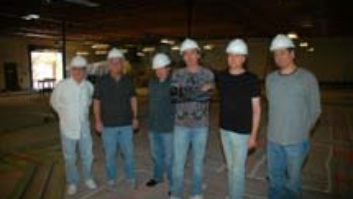Steve Hall, working away
In Future Disc Systems’
new mastering suite.
Photocredit: Rocketman
It was late, and he was hungry. Tracking a live Leonard Cohen session with producer Phil Spector, Steve Hall had ordered food. The front door intercom light signaled pizza arrival. Hall buzzed the courier into the control room. Suddenly the barrel of a large, ugly pistol was pressed to his temple. “Who the f**k is that?” Spector snarled, glaring at the boy. “NEVER let anyone into this studio without clearing it with me! Get him out.” Pausing before holstering his gun, he added, “Tell him to leave the pie.”

Not long after that night, Steve Hall decided to focus on mastering. “I’ve always enjoyed working alone,” he says. “It helps me bring an objective perspective to a project. I learned in my days as a recording engineer, you can get too close to an artist’s work. You can focus so long and so intensely that by the 67th mix, you can’t hear anything beyond the music you’ve recorded. It’s like a journalist handing in an article with a blatant typo. He’s read and reread the piece so often he can’t see the goof even though he’s looking right at it. A sharp editor will catch it immediately. Beyond the skills to technically improve the sound, a mastering engineer provides a fresh, objective set of ears.”
With 25 years as a leading Hollywood-based mastering maven, Future Disc founder Hall accrued a sizeable gold record collection. Working on a string of hits ranging from Tom Petty’s Full Moon Fever, Alice In Chains’ Dirt and Madonna’s True Blue to Blondie’s Heart of Glass and The Knack’s “My Sharona,” Hall honed his skills to a fine edge.
“Mastering is primarily a process of delicate fine tuning, but occasionally you’re inspired to make a more substantial recommendation,” he says. “Just recently, I was working on a UK-based classical pop group. They perform exquisite vocal harmonies backed by lush orchestrations. Listening carefully to the work, I decided to open the music up a bit, move it subtly away from the pop direction and ‘wrap’ the vocals by pushing them into the orchestrations. My mastering wasn’t dramatically different, but it was a departure from the original concept. I sent the files off to the engineer and didn’t hear anything back for a few days. This is not always a good sign.
“Finally,” Hall continues, “word came back that they wanted to adhere more closely to their original vision. In an effort to give them what they were looking for, I made the changes and sent it off again. A few days later the engineer called to say that after they’d listened in several different places, they were going back to my first pass. That’s a really good feeling, and a prime example of the creative contribution of the mastering process.”
Recently removed from Hollywood to the pastoral reaches of McMinnville, Oregon, Hall’s spacious new Future Disc mastering suite is outfitted with his own custom Big Bang Acoustics nearfields, Yamaha NS-10s, Bryston and Manley amplifiers and a powerful arsenal of digital processing gear including Weiss EQ1-MK2 24/96 7-band parametric EQ; Weiss DS-1 MK 3 compressor/limiter; TC Electronic 5000, Sonic Studio HD workstation and a complete NoNoise package. Analog processing includes GML 9500, Sontec, Manley Massive Passive and Pultec EQ, Manley Variable MU compressor and Manley el-op limiter. A set of three Pacific Microsonics Model 2’s provide A/D and D/A conversion.
“Gear is a critical component to the process,” Hall states, “but well-trained ears and an ability to relate to artists, producers and engineers is equally important. I want to know which of their tracks they favor most, which they’re least happy with, and why. I try to diagnose their music and get to the crux of where they’re trying to go with it. Sometimes I’ll ask a client for a reference CD. We’ll discuss what inspired them, what they want their music to sound like. Conversations like this can shape my thinking and sometimes crystallize the work for the artists themselves.
“Occasionally, something will come in and it’s so out of whack it’s almost impossible to bring it forward from point A to point B,” Hall says. “I may recommend that they go back into the studio to redo the mixes. They may need more drums or vocals, stuff that can’t be ‘finessed’ with plug-ins or EQ.”
Hall points to the proliferation of NS-10 monitors some years ago, which leveled the playing field and brought a consistency to control rooms that improved the tracking and subsequently the mastering process. “Today, however,” he says, “with the prevalence of home studios, all bets are off. Artists are listening (and recording) in a wider range of environments, which opens up a whole new can of worms for the mastering engineer. I’m seeing wide fluctuations in levels, balance and over-compression.
“The plethora of speaker options can muddy the waters,” Hall adds. “An artist just listening to his work on his own system may not be aware that his bottom is too light or too heavy, or his monitors too bright or too dark. He may be unaware of the peaks and dips caused by the room acoustics in his sweet spot. He may not realize he’s working in a ‘compromised’ environment. This is where mastering can make a difference: we can compensate for errors.
“Digital workstations don’t necessarily ensure a great sound,” he says. “With the abundance of plug-ins available today, things can tend to get overworked or even abused. The sonic character can frequently be severely compromised.”
While continuing to work with much of the vintage gear that has served him throughout his career, Hall has also kept pace with meaningful new innovations. “We recently added new software for our Weiss compressors, and working in the RMS mode allows me to simulate more of the analog vibe in a digital domain. Truth be told, the difference between some analog and digital gear is negligible. At the end of the day, the mastering engineer’s skills and level of taste can make a substantial difference in the quality and impact of the final mix.”
Hall believes that keeping the signal path as short as possible and making certain that all the gear is accurately clocked are vital concerns. “The advantages of a properly tuned room, and reliable reference monitors, can make a dramatic difference when you’re developing a deeper or wider stereo image and looking to make the music more exciting to listen to.”
Last year brought Hall’s Oregon-based studio a particularly diverse clientele. “I’ve worked on projects for Ziggy Marley, the Traveling Wilburys, Hilary Duff, Blind Melon, Last of the Breed, Department of Eagles, and a number of jazz artists. We’ve also had the opportunity to serve some old friends like engineers Mark Needham and Brad Gilderman. This year is starting off on a positive note with a fantastic All Angels project, and we’re optimistic that Future Disc will remain on the radar of artists, engineers and producers looking to give their work the fresh perspective and meaningful tweaks to help it reach its widest possible audience.”
Future Disc Systems
www.futurediscsystems.com




